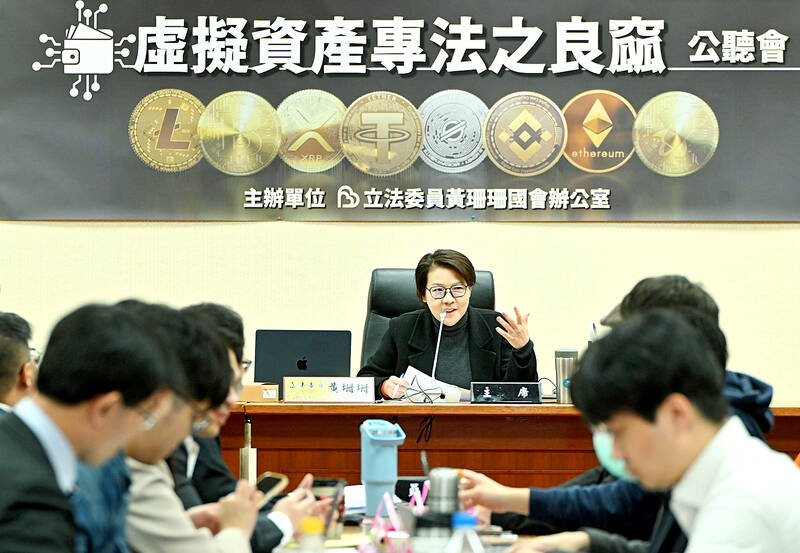The Financial Supervisory Commission (FSC) yesterday previewed a bill that would punish illegal activities linked to cryptocurrencies with steep penalties ranging from fines to prison sentences.
The government is drafting a bill to prevent the use of virtual assets in fraud, market manipulation, money laundering and terrorism, the FSC said in a report to the Legislative Yuan.
The draft act defines “stablecoins” as a class of tokens linked to one or more legal currencies created to keep value while establishing legal mechanisms to regulate their use, the commission said.

Photo: Tien Yu-hua, Taipei Times
Illegal activities that make use of virtual assets would be a crime punishable by three to 10 years in prison, and a fine of NT$10 million to NT$200 million (US$337,154 to US$6.74 million), it said.
The government is taking steps to help the private sector organize a virtual assets industry association to promote self-regulation, it said, adding that it would also implement a licensing scheme for traders, platforms, transferors, custodians and underwriters.
The draft act would provide architecture to accommodate new forms of financial transactions revolving around virtual currencies, FSC Deputy Chairman Chen Yen-liang (陳彥良) told the Finance Committee.
The commission’s approach utilizes government-run watchdogs and self-regulation by the private sector to enhance trust, which is necessary for prosperity in the industry, Chen said.
The commission has held about 20 conferences to solicit public opinion on the bill and expects to unveil the draft to lawmakers before the end of this month, he said.
Yesterday’s meeting at the Legislative Yuan was open to the public as part of a policy to ensure that businesses have opportunities to study the government’s policy and advise officials on matters concerning virtual assets, Democratic Progressive Party Legislator Lai Hui-yuan (賴惠員) said.

Right-wing political scientist Laura Fernandez on Sunday won Costa Rica’s presidential election by a landslide, after promising to crack down on rising violence linked to the cocaine trade. Fernandez’s nearest rival, economist Alvaro Ramos, conceded defeat as results showed the ruling party far exceeding the threshold of 40 percent needed to avoid a runoff. With 94 percent of polling stations counted, the political heir of outgoing Costa Rican President Rodrigo Chaves had captured 48.3 percent of the vote compared with Ramos’ 33.4 percent, the Supreme Electoral Tribunal said. As soon as the first results were announced, members of Fernandez’s Sovereign People’s Party

MORE RESPONSIBILITY: Draftees would be expected to fight alongside professional soldiers, likely requiring the transformation of some training brigades into combat units The armed forces are to start incorporating new conscripts into combined arms brigades this year to enhance combat readiness, the Executive Yuan’s latest policy report said. The new policy would affect Taiwanese men entering the military for their compulsory service, which was extended to one year under reforms by then-president Tsai Ing-wen (蔡英文) in 2022. The conscripts would be trained to operate machine guns, uncrewed aerial vehicles, anti-tank guided missile launchers and Stinger air defense systems, the report said, adding that the basic training would be lengthened to eight weeks. After basic training, conscripts would be sorted into infantry battalions that would take

GROWING AMBITIONS: The scale and tempo of the operations show that the Strait has become the core theater for China to expand its security interests, the report said Chinese military aircraft incursions around Taiwan have surged nearly 15-fold over the past five years, according to a report released yesterday by the Democratic Progressive Party’s (DPP) Department of China Affairs. Sorties in the Taiwan Strait were previously irregular, totaling 380 in 2020, but have since evolved into routine operations, the report showed. “This demonstrates that the Taiwan Strait has become both the starting point and testing ground for Beijing’s expansionist ambitions,” it said. Driven by military expansionism, China is systematically pursuing actions aimed at altering the regional “status quo,” the department said, adding that Taiwan represents the most critical link in China’s

‘REALLY PROUD’: Nvidia would not be possible without Taiwan, Huang said, adding that TSMC would be increasing its capacity by 100 percent Nvidia Corp CEO Jensen Huang (黃仁勳) on Saturday praised and lightly cajoled his major Taiwanese suppliers to produce more to help power strong demand for artificial intelligence (AI), capping a visit to the country of his birth, where he has been mobbed by adoring fans at every step. Speaking at an impromptu press conference in the rain outside a Taipei restaurant, where he had hosted suppliers for a “trillion-dollar dinner,” named after the market capitalization of those firms attending, Huang said this would be another good year for business. “TSMC needs to work very hard this year because I need a lot